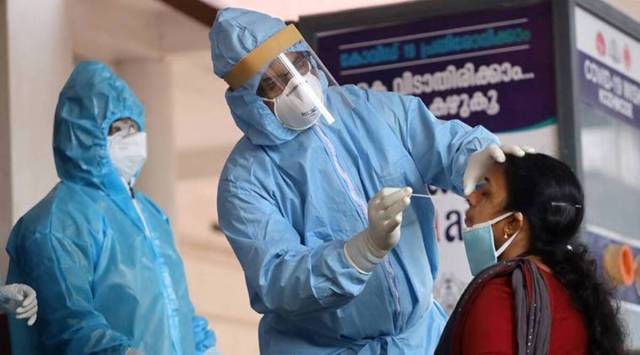Stay updated with the latest - Click here to follow us on Instagram
Global Covid surge prompts alert from Centre: Don’t let guard down
In a letter to state governments, Union Health Secretary Rajesh Bhushan said it was imperative that states and union territories take all precautions and do not let their guard down while resuming economic and social activities.
 The letter follows a meeting that Union Health Minister Mansukh Mandaviya had held with the country’s Covid task force on Wednesday. (File Photo)
The letter follows a meeting that Union Health Minister Mansukh Mandaviya had held with the country’s Covid task force on Wednesday. (File Photo)Amidst an unprecedented Covid surge in several countries, the Centre has asked states to step up vigil and intensify surveillance through aggressive genome sequencing to prevent any reversal in the trend of declining cases in India. It also underscored the need to monitor cases of influenza-like and severe acute respiratory illnesses to ensure that no early warning signals are missed.
🗞️ Subscribe Now: Get Express Premium to access the best Election reporting and analysis 🗞️
In a letter to state governments, Union Health Secretary Rajesh Bhushan said it was imperative that states and union territories take all precautions and do not let their guard down while resuming economic and social activities. The letter follows a meeting that Union Health Minister Mansukh Mandaviya had held with the country’s Covid task force on Wednesday.
“I would also like to emphasize that there should be continued focus on the five fold strategy, i.e. Test, Track, Treat, Vaccinate and (ensure) adherence to Covid appropriate behaviour,” Bhushan wrote.
He said states must keep submitting “adequate number” of virus samples for genome sequencing to ensure early detection of new variants, and continue to carry out an adequate number of tests as per protocols laid down by Indian Council of Medical Research (ICMR).
“It is also vital that states may ensure that all eligible persons are motivated to get vaccinated against Covid19 as per the recent expansion of vaccination drive to young adults and precautionary doses for adults besides the completion of doses for all adults,” Bhushan wrote.
The pandemic situation in India is under control right now, with new cases being at the lowest level since April 2020. On Thursday, only 2,528 new cases had been reported from across the country. The active caseload has come down below to 30,000, again a level not seen since the end of April 2020.
But several countries across the world, including many in India’s neighbourhood, are seeing an extraordinary surge. Most of the countries in central and western Europe; Malaysia, Indonesia, Singapore and Vietnam in southeast Asia; New Zealand and Australia; and now South Korea are witnessing a very high number of infections.
In fact, South Korea, whose population is at least 25 times less than India, has been reporting over 3.5 lakh new infections on an average for the last one week. On Thursday, that country detected over 6.21 lakh cases in a single day. A similar surge has been recorded in Hong Kong since the start of February, and to a lesser extent in China as well, but it seems to be slowing down now.
With international travel having resumed, the possibility of infections rising in India is real. One comforting factor is that the current wave of infections is still being driven by the Omicron variant which a large proportion of the Indian population has already been exposed to. The relatively high vaccine penetration could also be a source of hope.
At Wednesday’s meeting, Mandaviya directed officials to ensure aggressive genome sequencing of samples to detect possible new variants circulating in the community. The minister also said that authorities at the local level should be directed to intensify surveillance efforts for early identification of hotspots in India.







